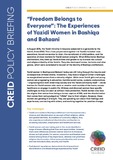| dc.contributor.author | Gedi, Zeri Khairy | |
| dc.coverage.spatial | Iraq | en |
| dc.date.accessioned | 2022-12-15T17:23:31Z | |
| dc.date.available | 2022-12-15T17:23:31Z | |
| dc.date.issued | 2022-12 | |
| dc.identifier.citation | Gedi, Z.K. (2022) “Freedom Belongs to Everyone”: The Experiences of Yazidi Women in Bashiqa and Bahzani, Policy Briefing 11, Coalition for Religious Equality and Inclusive Development, Brighton Institute of Development Studies, DOI: 10.19088/CREID.2022.009 | en |
| dc.identifier.uri | https://opendocs.ids.ac.uk/opendocs/handle/20.500.12413/17807 | |
| dc.description.abstract | This CREID Policy Briefing provides recommendations to address the marginalisation, discrimination and exclusion faced by Yazidi women in Bashiqa and Bahzani. Yazidi women in Bashiqa and Bahzani today are still living through the trauma and consequences of the genocide committed by the Islamic State (ISIS). In addition, they face a range of further challenges as marginalised women from a minority religion. While more Yazidi girls and young women are progressing in education, harmful social norms, customs and practices – originating from both wider Iraqi society and the Yazidi community itself – create barriers for Yazidi women who want or need to work outside of the home, access healthcare or engage in public life. Widows and divorced women face specific challenges as they are seen as without male protection. Yazidi women also face the stigma that comes from being a former captive of ISIS, and the discrimination that comes from being judged an “infidel” due to their religion. | en |
| dc.language.iso | en | en |
| dc.publisher | Institute of Development Studies | en |
| dc.relation.ispartofseries | CREID Policy Briefing;11 | |
| dc.rights | Attribution-NonCommercial-NoDerivs 2.0 UK: England & Wales | en |
| dc.rights.uri | http://creativecommons.org/licenses/by/4.0/ | en |
| dc.subject | Participation | en |
| dc.subject | Politics and Power | en |
| dc.subject | Poverty | en |
| dc.subject | Rights | en |
| dc.subject | Security and Conflict | en |
| dc.subject | Work and Labour | en |
| dc.title | “Freedom Belongs to Everyone”: The Experiences of Yazidi Women in Bashiqa and Bahzani | en |
| dc.type | Series paper (non-IDS) | en |
| dc.rights.holder | © Institute of Development Studies | en |
| dc.identifier.team | Power and Popular Politics | en |
| dc.identifier.doi | 10.19088/CREID.2022.009 | |
| rioxxterms.funder | Department for International Development, UK Government | en |
| rioxxterms.identifier.project | Coalition for Religious Equality and Inclusive Development (CREID) | en |
| rioxxterms.version | VoR | en |
| rioxxterms.versionofrecord | 10.19088/CREID.2022.009 | en |
| rioxxterms.funder.project | 7a473ec6-92f8-49ff-98df-9ec27d8d5fe6 | en |


